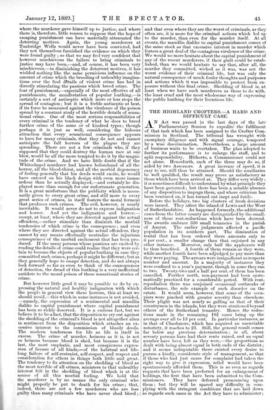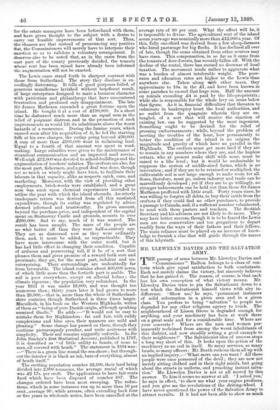THE HIGHLAND CROFTERS.—A HARD AND DIFFICULT CASE.
AN Act was passed in the last days of the late Parliamentary Session to expedite the fulfilment of that task which has been assigned to the Crofter Com- mission in Scotland. The tribunal has wrought with exemplary diligence and with signal courage, tempered by a wise discrimination Nevertheless, a large amount of business waits to be overtaken. The plan adopted to further its performance is to enlarge the staff, and to split responsibility. Hitherto, a Commissioner could not act alone. Henceforth, each of the three may do so, if aided by two Assessors. A great increase of speed, it is easy to see, will thus be attained. Should the auxiliaries be well qualified, the result may prove as satisfactory as those which have been arrived at. They differ very widely ; it is sometimes difficult to understand by what principle they have been governed ; but there has been a notable absence of any disposition to impugn them, and where criticism has been ventured on, it has turned out inept and futile.
Before the holidays, two big clusters of fresh decisions were issued. They affect the island of Lewis and the West of Sutherlandshire. As happened formerly, the additional cases from the latter county are distinguished by the small- ness of those rent-reductions which have been decreed. The awards embrace 330 small tenancies in the parish of Assyut. The earlier judgments affected a pacific population in its southern part. The diminution of rental that has been ordered there amounts only to 6 per cent., a smaller change than that enjoined in any other instance. Moreover, only half the applicants will be thus benefited. A fourth of them remain as they were, while another fourth have been adjudgedlo pay more than they were paying. The arrears were insignificant as respects number and amount. In a majority of instances they were confined to a year's payment, though in some they ran to two. Twenty-two and a half per cent. of them has been cancelled. Further north, non-payment had been syste- matically practised for a considerable period. With rent- repudiation there was conjoined occasional outbreaks of disturbance, the sole example of such disorder on the estate. It would seem, however, that some of the occu- piers were pinched with greater severity than elsewhere. Their plight was not nearly so galling as that of their countrymen in the islands, but they were straitened beyond others of the Sutherland tenantry. Hence the reduc- tions made in the remaining 192 cases bring up the average over all to 13 per cent. In particular instances, as in that of Chashmore, which has acquired an unenviable notoriety, it reaches to 23. Still, the general result comes far below any previous determination ; in all, about seventy persons have had their rents raised, and an equal number have been left as they were,—the proportions so dealt with being almost equal in both ends of the district ; and it seems indisputable there existed every desire to pursue a kindly, considerate style of management, so that if those who had just cause for complaint had taken the right way to give it expression, • relief would have been spontaneously afforded them. This is so even as regards requests that have been preferred for an enlargement of holdings, the first that have been submitted to the Com- missioners. They have deferred pronouncing upon them ; but they will be spared any difficulty in com- plying with the stringent conditions that are laid down as regards such cases in the Act they have to administer ; 'for the estate managers have been beforehand with them, and thave given thought to the subject with a desire to carry out feasible improvements of that sort. Thus, the chances are that instead of pronouncing any positive fiat, the Commissioners will merely have to interpose their sanction so as to validate a voluntary arrangement. It deserves-also to be noted that, as in the cases from the -east part of the county previously decided, the tenants • whose rent has been raised have already been informed the augmentation will not be exacted.
The Lewis cases stand forth in sharpest contrast with those from Sutherland. The story they disclose is ex- ceedingly distressing. It tells of good. purposes foiled, of generous munificence lavished without beneficent result, of large enterprises designed to mate a business character with patriotism and philanthropy that have encountered -frustration and produced only disappointment. The late Sir James Matheson expended a great fortune upon the island. He bought it at a cost of £190,000. In a short time he disbursed much more than an equal 811131 in the relief of poignant distress, and. in the promotion of such improvements as would lift its inhabitants above the worst hazards of a recurrence. During the famine years, which ensued soon after his acquisition of it, he fed the starving folk at his own charges, the outlay going beyond £30,000. A sum of more than £100,000 went in reclaiming land. Equal to a fourth of that amount was spent in road. making. Large subsidies were given to the maintenance of steamboat communication and an improved mail service. Well-nigh £12,000 was devoted to school-buildings and the augmentation of teachers' salaries. The crofters are also, for the most part, fishermen, and a good deal was done, though not so much as wisely might have been, to facilitate their labours in that capacity, alike as respects catch, cure, and marketing. Moreover, with the view of providing other employments, brick-works were established, and a great sum was sunk upon chemical experiments intended. to utilise the peat with which the island abounds. An utterly 'inadequate return was derived from all this unstinted expenditure, though its outlay was regulated by advice deemed. informed and trustworthy. Its gross amount, beyond the purchase. price, and independent of the capital spent on Stornoway Castle and grounds, mounts to over £260,000. Sad to say, much of it was wasted. The result has been naught. The mass of the people axe no whit better off than they were half-a-century ago. They are as distressed now as they were ordinarily then, and, it must be added, as impracticable. They have more intercourse with the outer world, but it has had little effect in changing their condition. Capable of arduous and persevering toil, if it be of a sort that pleases them and gives promise of a reward both sure and proximate, they are, for the most part, indolent and un- enterprising. Their surroundings are undoubtedly far from favourable. The island contains about 400,000 acres, of -which little more than the fortieth part is arable. The soil is poor everywhere, except on alluvial holms ; the climate rigorous ; the population very redundant. In the year 1851 it was under 18,000, and was thought too numerous then ; thirty years later it had grown to more than 26,000,—that is, more than the whole of Sutherland- shire contains, though Sutherland is three times larger. Maculloch, in his book on the Western Highlands, writes of them as "-being of pure Danish origin, although speaking unmixed Gaelic." He adds :—" It would not be easy to mistake them for Highlanders: fat and fair, with ruddy complexions and blue eyes, their manners are mild and pleasing." Some change has passed. on them, though they continue picturesquely peculiar, and unite acuteness with simplicity. Their soil remains niggardly unfertile. In Sir John -Sinclair's first Statistical Account, published in 1797, it is described as "of little utility to beasts, of none to man, all covered with heath." The statement in 1834 was : --" There is a green line round the sea-shore ; but through- out the interior it is black as ink, bare of everything, almost of 'heath itself."
The crofting population number 22,500, their land being divided into 2,900 tenancies, the average rental of which was £2 17s. per croft. The applications to have fair rents fixed which have been disposed of number 607. The changes ordered have been most sweeping. The reduc- tions, which in some instances run up to more than 50 per cent., average 36 ; while arrears, often extending back four or -five years in wholesale series, have been cancelled at the average rate of 80 per cent. What the effect will be, it is impossible to divine. The agricultural rent of the island seven years ago was nominally more than £12,000 a year. Of this, fully one-third was derived from a few sheep-farmers who hired pasturage for big flocks. It has declined all over of late, though the sums obtained from other sources may have risen. This compensation, in so far as it came from the tenants of deer-forests, has recently fallen off. With the decline of the rental, there has ensued no decrease of local taxation. The movement tends rather to aggravate what was a burden of almost intolerable weight. The poor. ratesand education rates are higher in the Lewis than anywhere else. Taken along with other taxes, they approximate to 10s. in the Xl, and. have been known in some parishes to exceed. that huge sum. Half the amount on rentals exceeding £4 is paid. by the life-proprietrix ; while she is responsible for the whole levy on sums below that figure. As it is, financial difficulties that threaten to culminate in bankruptcy beset the local authorities, and. no outlet from the quagmire wherein they are en- tangled, of a sort that will receive the sanction of existing law, can be suggested by the most ingenious. Something ought to be devised for the relief of pressing embarrassments ; while, beyond the problem of meeting the troubles of the hour, how permanently to better the condition of the island is an enigma the magnitude and gravity of which have no parallel in the Highlands. The crofters must get more land if they are to remain in any numbers where they are, and the hapless cottars, who at present make shift with none, must be raised to a like level ; but it would be undesirable to suppress the system of middle-sized farms, which is no innovation ; and if they are to be retained or multiplied, the cultivatable soil is not large enough to make room for all. Some, therefore, must go, unless industry and trade can be marvellously developed ; yet if they are to go willingly, no stronger inducements can be held out than those Sir James Matheson proffered with little avail. Forty years since, he was willing to forgive all debts, to buy their cattle from the crofters if they could find no other purchaser, to provide &passage to Canada, and, if a sufficient number volunteered, to send with them pastors and teachers. The Scottish Secretary and his advisers are not likely to do more. They may have better success, though it is to be feared the Lewis men are too conservative and too gregarious to depart readily from the ways of their fathers and their fellows. The main reliance must be placed on an increase of know- ledge to furnish a clue that will guide through the mazes of this labyrinth.







































 Previous page
Previous page